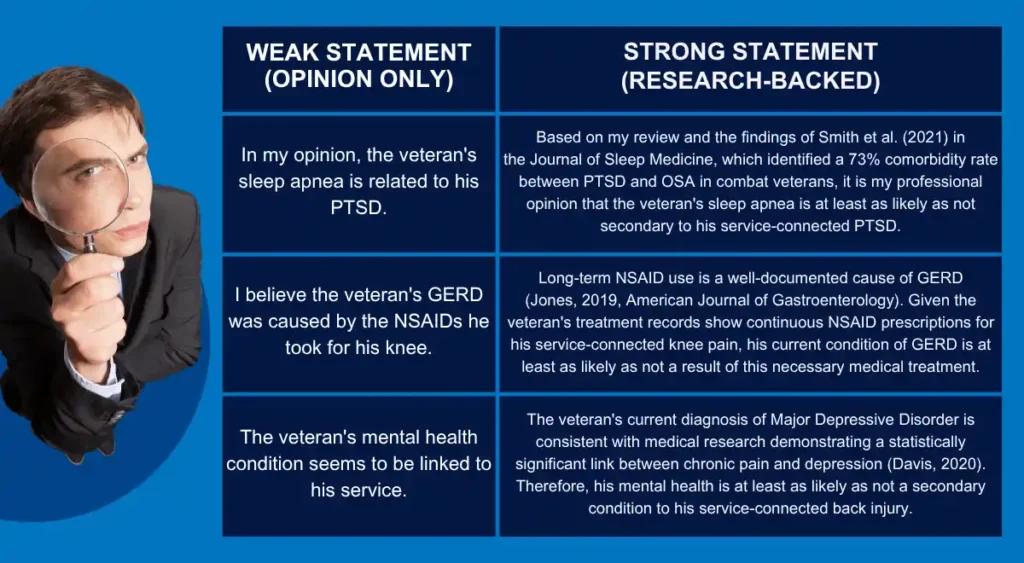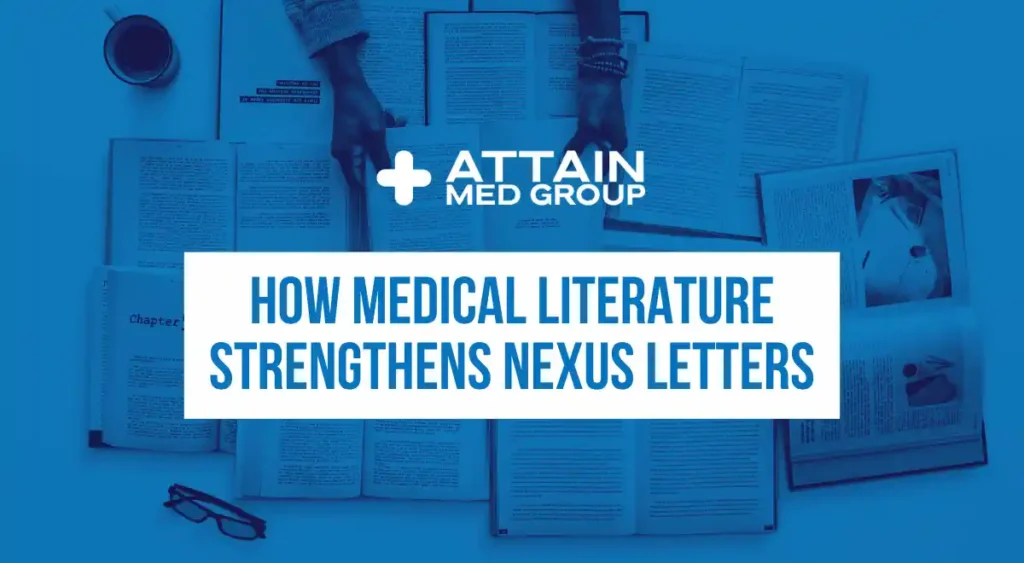I get it. You’ve probably felt like you’re shouting into the wind when dealing with a VA disability claim. You submit your paperwork, your doctor’s notes, and your service treatment records, only to receive a denial letter that feels cold and impersonal. Discover why citing medical research in a VA nexus letter strengthens service connection and improves your chances of claim approval. This single step can transform a good VA claim into an undeniable one.

What exactly is a VA Nexus Letter?
Think of a VA nexus letter as the critical bridge in your disability claims. It connects two very important points: your current health condition and an event, injury, or illness from your military service. Without this bridge, establishing service connections can be difficult and your claim may fall apart.
A qualified healthcare provider, often offering an independent medical opinion, writes this letter. They review your service treatment, your post-service medical history, and then offer their expert medical opinion. The most important part of a strong nexus letter is a clear nexus statement that your condition is “at least as likely as not” related to your service.
Those specific words are incredibly important for the VA claims process. They represent the legal standard the VA uses to grant service connection. But sometimes, just the doctor’s words in a medical nexus letter aren’t enough to secure your VA disability benefits.
Why Your Doctor’s Opinion Isn’t Always Enough
You might believe a letter from your trusted doctor is an automatic win for your VA disability claim. The VA, however, does not always see it that way. To them, it can look like just one person’s medical opinion against their own examiner’s findings.
The person reviewing your file, the VA rater, is not a medical expert. They are a trained decision-maker following a specific set of rules and regulations. They need clear, objective evidence to approve VA disability claims and award a disability rating.
A doctor’s opinion without a solid medical rationale can be challenged easily. A Compensation and Pension (C&P) examiner hired by the VA might disagree, leaving the VA rater to weigh one opinion against another. Your claim for VA benefits then becomes a toss-up, which is a frustrating position for any veteran.
The Power of Medical Research: Your Secret Weapon
This is where medical research completely changes the game for your VA claim. Citing established, peer-reviewed medical studies elevates your nexus letter from a simple opinion to an evidence-backed report. A strong nexus becomes much harder for VA raters to ignore or dispute.
Scientific research shows the VA that your situation isn’t an isolated incident. It demonstrates a known, documented link between a specific military experience and a medical condition, providing the evidence to support your claim needs. You are providing proof that the broader scientific community is on your side.
Suddenly, the letter isn’t just what your doctor thinks; it is what the medical community has studied and proven. This gives your disability claim the solid foundation it needs to stand strong against scrutiny during the claims process. It is a key element for a successful claim.

Discover why citing medical research in a VA nexus letter strengthens service connection and improves your chances of claim approval.
Adding medical literature does more than just make your letter look professional. It actively works in your favor in several powerful ways. It transforms your claim file from a stack of papers into a compelling argument for establishing service connection.
Adds Credibility and Authority
When the professionals who write nexus letters cite a study from a publication like the New England Journal of Medicine, they are borrowing its authority. Peer-reviewed research is the gold standard in the medical world. It means other experts have reviewed and verified the findings, adding significant weight to the medical nexus.
This tells the VA rater that the opinion is not just a guess. It is based on rigorous scientific investigation and relevant medical studies. This simple act makes the conclusion in the medical nexus letter much more persuasive and hard to refute.
Educates the VA Rater
VA raters have a tough job. They see hundreds of different health condition claims. It is impossible for them to be an expert in everything from hearing loss to complex mental health conditions.
Medical research acts as a mini-lesson for them. It explains the “how” and “why” behind your service connection with concise language they can understand. The letter can break down the science in a way that connects the dots for the rater, making their job of approving your claim easier.
For a secondary condition, this is especially vital. A nexus letter citing a study that shows a high prevalence of sleep apnea in veterans with PTSD gives the rater the exact justification they need for establishing service and granting secondary service connection. The letter provides a clear path to approval.

Fights Back Against Negative C&P Exams
A negative C&P exam can feel like a death sentence for your claim. Often, these exams are brief, and the examiner may not have a full picture of your history from your service treatment records. They might issue an opinion that harms your case, making the appeals process seem inevitable.
A nexus letter backed by scientific literature is your best defense. It allows your medical expert to directly challenge the C&P examiner’s opinion with facts, not just a counter-opinion. This independent medical opinion can point to multiple studies that contradict the C&P examiner’s findings.
This gives the VA a very good reason to question the C&P exam’s probative value. A well-researched nexus letter can give your evidence more weight than a rushed exam, which can be critical for a supplemental claim. It provides the strong medical evidence needed to overcome a negative finding.
Comparing a Weak vs. Research-Backed Nexus Statement
The difference a citation can make is clear when you see it side-by-side. The right phrasing and evidence can dramatically increase the strength of your claim. Here is a simple table showing the impact:

How to Find the Right Medical Research
The medical expert who will write the nexus letter for you should handle this part. But you can also be an active participant in your own VA claims process. Knowing where to look helps you have a more informed discussion with your provider.
Excellent sources for medical research include:
- PubMed: A huge, free database run by the National Institutes of Health. It is the go-to for medical professionals looking for current medical literature.
- Google Scholar: A search engine specifically for scholarly articles and research papers across many disciplines.
- Medical Journals: Look for journals specific to your condition, such as those focusing on traumatic stress, audiology for hearing loss, or internal medicine.
- VA Publications: The VA itself publishes research on health conditions common among veterans, including those related to Agent Orange exposure.
The goal is to find studies that show a strong association between an in-service event or condition and your current diagnosis. Look for phrases like “statistically significant correlation” or “increased risk.” The stronger the link shown in the research, the better it is for your successful claim.
Putting It All Together in the Nexus Letter
It’s not enough to just list a few studies at the bottom of the letter. The medical expert needs to weave the research directly into their analysis and medical rationale. This is a critical step to write nexus and create a powerful document.
The doctor should clearly explain what a study found. Then, they must connect those findings directly to your personal situation and the veteran’s current medical evidence. It is a two-step process of showing the science and then applying it to you.
For instance, a provider might write, “A 2018 study in the Journal of Traumatic Stress found that veterans exposed to IED blasts have a 60% higher rate of developing migraines. Mr. Smith’s service records confirm three separate IED exposures, and his treatment records document the onset of migraines shortly thereafter, which aligns with this established medical evidence.”
A Quick Example to See It in Action
Let’s imagine a veteran filing for GERD as a secondary condition to his use of NSAIDs for a service-connected knee injury. His claim has been denied before. The VA said there was no link, a common issue in establishing secondary service connection.
This time, his medical nexus letter is different. His doctor includes citations from gastroenterology journals. The research clearly shows that long-term NSAID use is a major cause of GERD, providing a strong medical basis for the claim.
The letter explains this research and points to the veteran’s own medical records, showing years of prescriptions for high-dose ibuprofen for his knee pain. The letter concludes that based on the scientific literature and the veteran’s history, his GERD is “at least as likely as not” caused by medication for his service-connected knee. This is how you build a strong nexus.
See the difference? It is no longer just an opinion. It is a logical argument backed by science that the VA will find very difficult to dismiss, which can greatly improve your chances of getting the disability benefits you deserve.

Conclusion
Trying to win a VA disability claim can feel like an uphill battle. You have tools available to make your case stronger, and a well-written nexus letter is one of the most powerful. When that letter includes compelling medical research, it becomes a key element of your success.
You can discover why citing medical research in a VA nexus letter strengthens service connection and improves your chances of claim approval. It provides the objective, scientific proof the VA needs to see. This crucial step moves your claim from the “maybe” pile straight to the “approved” pile.

